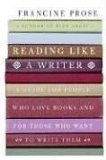
A Guide for People Who Love Books and Those Who Want to Write Them
Reviewed May 6, 2010.
HarperCollinsPublishers, 2006. 273 pages.
Francine Prose begins her book like this:
Can Creative Writing be taught?
It's a reasonable question, but no matter how often I've been asked, I never know quite what to say. Because if what people mean is: Can the love of language be taught? Can a gift for storytelling be taught? then the answer is no. Which may be why the question is so often asked in a skeptical tone implying that, unlike the multiplication tables or the principles of auto mechanics, creativity can't be transmitted from teacher to student. Imagine Milton enrolling in a graduate program for help with Paradise Lost, or Kafka enduring the seminar in which his classmates inform him that, frankly, they just don't believe the part about the guy waking up one morning to find he's a giant bug.
What confuses me is not the sensibleness of the question but the fact that it's being asked of a writer who has taught writing, on and off, for almost twenty years. What would it say about me, my students, and the hours we'd spent in the classroom if I said that any attempt to teach the writing of fiction was a complete waste of time? Probably, I should just go ahead and admit that I've been committing criminal fraud.
She goes on to admit:
Like most, maybe all, writers, I learned to write by writing and, by example, from books....
In the ongoing process of becoming a writer, I read and reread the authors I most loved. I read for pleasure, first, but also more analytically, conscious of style, of diction, of how sentences were formed and information was being conveyed, how the writer was structuring a plot, creating characters, employing detail and dialogue. And as I wrote I discovered that writing, like reading, was done one word at a time, one punctuation mark at a time. It required what a friend calls 'putting every word on trial for its life': changing an adjective, cutting a phrase, removing a comma, and putting the comma back in.
I read closely, word by word, sentence by sentence, pondering each deceptively minor decision that the writer had made. And though it's impossible to recall every source of inspiration and instruction, I can remember the novels and stories that seemed to me revelations: wells of beauty and pleasure that were also textbooks, private lessons in the art of fiction.
This book opened my eyes to things about the writing process that had gone right past me before. She talks about and gives examples of writers who chose just the right word, then goes on to talk about beautiful sentence-level writing, and then the way writers construct paragraphs. She talks about narration and dialogue, and creating characters. She talks about telling details and gestures.
I must admit this book reads a bit like a college textbook. I took it very slowly, only tackling a chapter at a time, if that. But it would be a textbook for a fascinating, enlightening college class, and I couldn't help but be jealous of her students.
With this book, Francine Prose equips the reader to better appreciate -- and therefore emulate -- the fine art of writing beautiful and powerful fiction.
